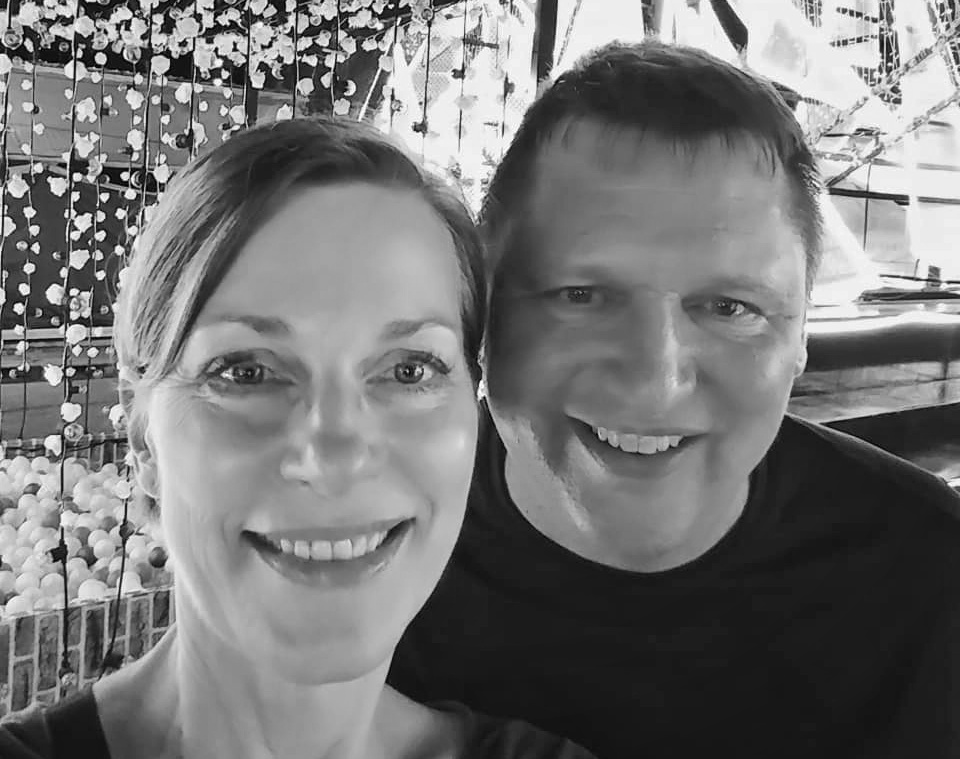Addiction and Recovery, Spiritual Living
3 Things I’ve Learned in 34 Years of Marriage

This weekend, my wife Charlene and I will celebrate 34 years of marriage. It’s hard to imagine that we’ve been together so long. We are so young! How did this happen?! One day you wake up, and you realize you’ve been with this person for 34 years.
I wrote about these three myths in my email newsletter, but I’d like to share them here as well. I’ve seen many marriages struggle, and many break apart. I’ve also seen people stay together in marriage, but live with ongoing dysfunction, lack of intimacy, and unhappiness. Having marriages that last is a pretty low bar of “success.” What we want is not simply that marriages that endure, but marriages that thrive.
I have come to believe that good marriages are rare, because they’re hard to sustain. But they are worth the effort! Believing these three myths get in the way of that:
Myth 1 — That a good marriage shouldn’t require a lot of maintenance
Maintenance has gotten a bad rap. We don’t think that good relationships should need maintenance. If somebody is difficult to get along with, we call them “high maintenance.” In marriage, many people assume that if they marry the right person, then the relationship should stay strong and healthy without a lot of maintenance. They assume that as time goes by, a good relationship will just stay strong.
It doesn’t work that way. GK Chesterton once said that “the fundamental flaw of conservatism is believing that if you leave a white picket fence alone, it will stay white.” It’s the belief that if don’t do anything to “mess with,” tune up, or re-invigorate something, that it will continue on as is. It won’t. If you want your white fence to stay white over time, you’ll have to clean it periodically, and re-paint it every few years.
Most people are well aware of the need for maintaining their cars and trucks. Most people are aware of the need for maintaining the health of their physical bodies. Or their homes. Or their businesses. They know that if they don’t, they’ll pay the price.
Isn’t it ironic that people think nothing of spending massive amounts of time, energy, and money maintaining physical things, like cars — things that will last at most a few years, and bring only a marginal sense of joy and satisfaction — while ignoring the need to maintain the ONE keystone relationship that brings joy, stability, and happiness to life?
Mark Brouwer (share this quote)
All relationships — especially marriages — take time and energy to maintain. Life happens. We do things that our partner misunderstands, or is gets hurt by. Stressful things happen in our lives that pull us apart. Other people, our work, or outside commitments come between us, challenging the health of our relationships.
Marriages are like gardens. They can be beautiful, but if not actively maintained, they will deteriorate. It doesn’t matter how great the soil is, or how beautiful and sturdy the plants are … over time things will change. This is true of all marriages too.
Imagine you were given a beautiful garden, but did nothing to it. Over time, weeds would crop up, the plants would grow in unhealthy and destructive ways, and over time, the fruits and flowers would diminish, and the beauty would fade. That’s how it is with marriage.
Some people find that the joy and intimacy they have with each other is at its peak on the day of their wedding. And as the years progress, that joy and intimacy deteriorates. The quality of their relationship is at its height on day 1 and goes downhill from there.
It doesn’t have to be that way. But it WILL be that way if you treat it like the garden I described above and just let it go.
What if I told you that its possible — and many people find this to be the case — that the quality of joy and intimacy could get BETTER over the years of your marriage? It absolutely can, and frequently does, for people who treat their marriage like a garden, and tend it accordingly.
Maintaining a marriage requires the willingness to spend time and energy to building it, and paying attention to things that threaten it. It also sometimes requires spending money on it … money for vacations, and time together. Money for expert help and consultants.
Over the years Charlene and I have invested a LOT of time and money on marriage counseling, couple retreats, and time away together. I don’t regret any of that time or money. It was a great investment. We are now an “old, middle age couple,” enjoying each other as much, if not more than we did in our early marriage.
MYTH 2 — That marriage is good for you because it makes your life more easy and pleasant
Most people think that marriage — assuming it’s with the right person — makes our life “better” … and by better, they mean “happier and easier.” It helps us become better people by adding good things to our lives: We are less lonely, because we have a companion. We are stronger and more safe, because we have someone to help us. Our life is better, because we have love, and that love affirms us, and gives us joy and happiness … a refuge from the harsh world.
Hopefully a good marriage is all that … but the way it helps us and makes us grow is different than we sometimes assume.
A marriage is not like a Jacuzzi … a marriage is like a fire. Any intimate relationship will have an edge to it. We will find ourselves sometimes affirmed by our partner, but also challenged, frustrated, and disappointed.
An important way marriage helps us, and makes our life better, is that it forces us to change and grow. And this pretty much always happens in the context of pain, disappointment, and frustration.
When I say marriage is like a fire, I don’t mean a destructive fire that wrecks everything in its path. Hopefully that’s not what happens. I’m thinking of fire, in the old-school sense of the term: the fire that’s used to reshape and purify things.
When metal-workers put objects in the fire, the heat makes them malleable, and allows them to be re-shaped. Hard edges can be smoothed over, bends can be straightened. Or, when a goldsmith puts ore in the fire, it burns away all the impurities, so that what is left is pure, valuable gold.
That’s what marriages are, and that’s why they help us so much. They help us not simply because they make our life more comfortable and fun. They help us because they challenge us, and force us to let go of our childish selfishness and narcissism. They help us because they challenge the codependence and manipulation that keep us from being honest about what we really want and need.
Think of it this way — your spouse is the person God brought into your life because this person is what you require to grow to the next level. The writer of Ecclesiastes puts it this way: “two are better than one.” Good couples are better together … they bring the good out of each other … and part of how they do that is through clashes and misunderstandings and hurt feelings, followed by deep reflection, and difficult conversations, and changes in communication patterns and behavior.
Couples that have good, long term marriages are better because of those marriages … and those marriages are like fire, that burns away the dross.
MYTH 3 — That a good marriage is the product of just two people
Many people think that a good marriage is the product of just two people: the husband and wife. “It takes two.” “It’s just you and me babe.” “You and me against the world.”
But that’s a myth. It takes more than two to make a good marriage. It takes a community. It takes extended family, friends, and sometimes helpers, like counselors and coaches.
People used to understand this. For eons, marriage and child-rearing happened in the context of close-knit communities. Couples went through the ups and downs of life and relationship surrounded by a tribe of supportive family members and friends. New parents had an abundance of help with child care and child raising.
Of course it was not all perfect: sometimes these extended families were dysfunctional, and sometimes these communities or tribes were unhealthy and oppressive. But at least they were there … and by being there, they helped the couples in them.
Marriages in our time are suffering because people are cut off from friends and family, and wind up putting too much pressure on each other. Partners look to their spouse to be the sole emotional support and parenting partner. Nobody can be that. We need others: friends and family members we can vent to, have fun and blow off steam with.
By the way, it’s incumbent on us friends and family to be genuinely supportive. This means being honest as well as compassionate with you when you’re going through hard times. Being a supportive friend doesn’t mean that we always take your side and thus enable you. A good friend is someone who will tell you the truth, not simply commiserate with you about how selfish and unreasonable your spouse is being.
Friends don’t let friends live in delusion. Sometimes the best thing our friends and family can do for us is to lovingly tell us that we — not our spouse — are the ones being unreasonable, selfish, or crazy.
The Third Strand …
Finally, I need to add one more part of this “more than just the two of us” myth. Good marriages need God.
One of the fundamental teachings of the Christian tradition is that when we come to faith, the Holy Spirit ignites the divine spark within us that so many people talk about, and so few people understand. The Spirit of God within us softens our hearts, makes us more loving, patient, and compassionate. If that Spirit of God is alive and predominant in us, it allows us to function in more healthy and loving ways, and makes our marriages so much better. Not only that, but this faith journey supports us in the process of burning away the parts of our character that creates dysfunction in relationships — selfishness, resentment, impatience, contempt, rage, dishonesty, etc.
In many Christian weddings, we reference Ecclesiastes 4:12 “Though one may be overpowered, two can defend themselves. A cord of three strands is not quickly broken.” This comes in the context of an extended discussion about how “two are better than one” (referenced above). But in verse 12 we find the off-hand comment, “a cord of three strands is not quickly broken.”
In the context of marriage, I think of that third strand as the presence and power of God at work in the couple relationship. The Divine is the third strand, and when God is at the center of the relationship, a strong cord is braided together that is stronger than a single — or even two — strands.
Closing …

I want to close this by saying once again that the goal Charlene and I have is not just a marriage that survives and lasts a long time. Almost anybody can do that, if they are supremely committed to hang in there, which often happens when people feel like they don’t have other options.
I’m talking about marriage that is long, but also good. One that gets better over time, even in the midst of the inevitable ups and downs that we experience in all our relationships. A marriage that thrives, that makes life better, and makes you better, because you are together.
